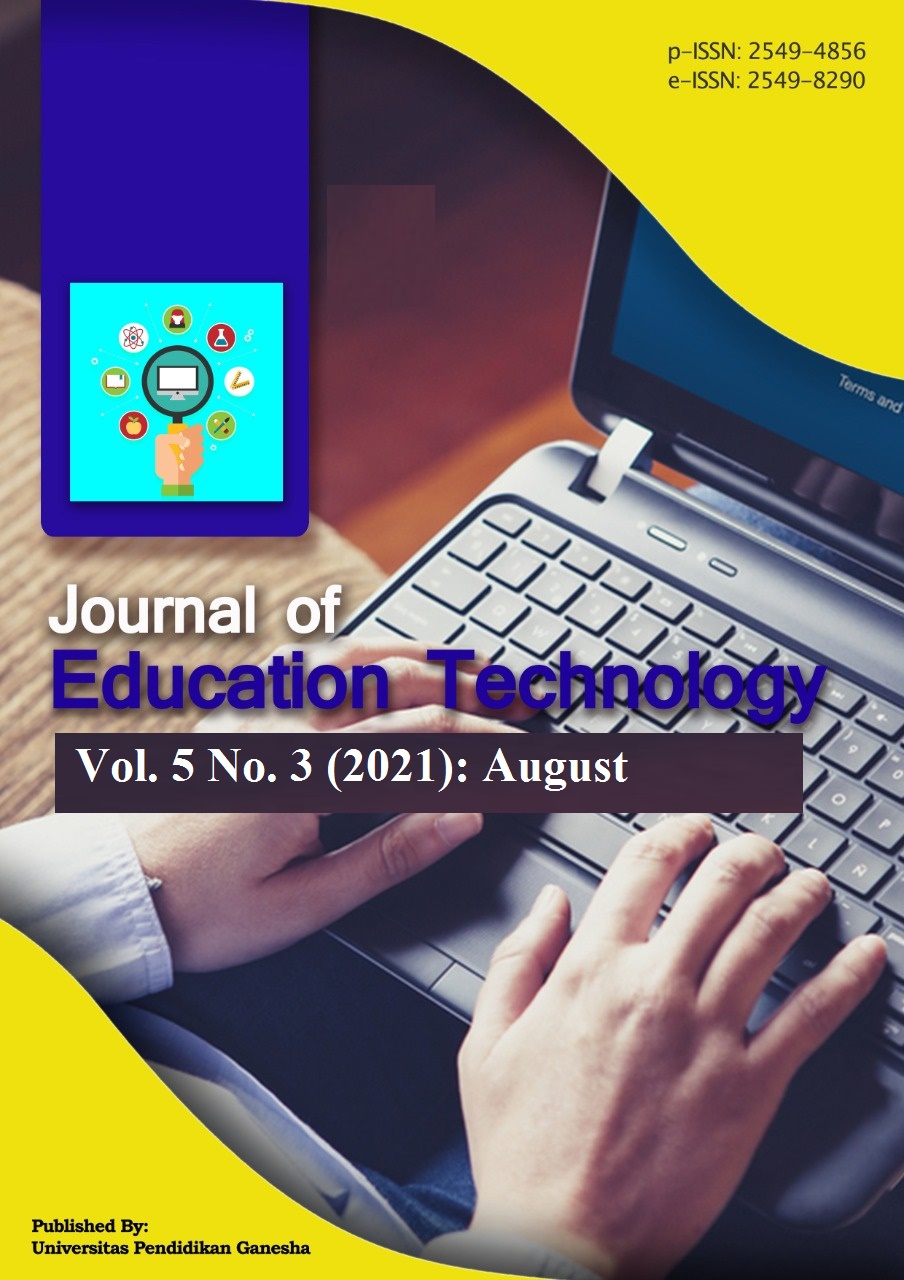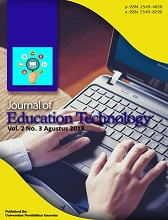Online Learning Evaluation in Higher Education: Study Survey Method
DOI:
https://doi.org/10.23887/jet.v5i3.35466Kata Kunci:
distance learning, evaluation, online, student, courseAbstrak
The challenge of online learning for students is the lack of direct interaction between students and lecturers, causing students to have difficulty learning. In addition, unstable internet network constraints cause the learning process not to run optimally. This paper aims to develop online learning in universities. The type of research is a descriptive survey. The research respondents were 96 students. This study examines the effectiveness of the online learning process. Data were analyzed and compared with research results in journal articles. The online learning evaluation analysis from the side of the first student showed that students were more interested in face-to-face learning than online. Second, most students plan to study now for future use. Third, the main obstacles faced by students are internet access and internet quota. Lecturers have an essential role in helping students learn online. Third, students need groups to share the happy learning process. Thus, the readiness of lecturers and students in online learning needs to be improved with the support of learning technology devices.
Referensi
Abosalem, Y. (2016). Assessment Techniques and Students’ Higher-Order Thinking Skills. International Journal of Secondary Education, 4(1), 1–11. https://doi.org/10.11648/j.ijsedu.20160401.11.
Alhefnawi, M. A. M. (2021). Assessing the Efficacy of Online Handouts and Active Lectures in Learning Outcomes at the Engineering Undergraduate Level. Ain Shams Engineering Journal, 40. https://doi.org/10.1016/j.asej.2021.02.012.
Aulia, E. V., Poedjiastoeti, S., & Agustini, R. (2018). The Effectiveness of Guided Inquiry-Based Learning Material on Students’ Science Literacy Skills. Journal of Physics: Conference Series, 947, 1–7. https://doi.org/10.1088/1742-6596/1088/1/012106.
Beck, E., Goin, M. E., Ho, A., Parks, A., & Rowe, S. (2021). Critical Digital Literacy as Method for Teaching Tactics of Response to Online Surveillance and Privacy Erosion. Computers and Composition. https://doi.org/10.1016/j.compcom.2021.102654.
Bosshardt, W., & Chiang. (2018). Evaluating the Effect of Online Principles Courses on Long-Term Outcomes. International Review of Economics Education. https://doi.org/10.1016/j.iree.2018.03.001.
Decuypere, M. (2020). Visual Network Analysis: A Qualitative Method for Researching Sociomaterial Practice. Qualitative Research, 20(1). https://doi.org/10.1177/1468794118816613.
Elfeky, A. I. M., & Masadeh, T. S. Y. (2020). Advance Organizers in Flipped Classroom Via E-Learning Management System and the Promotion of Integrated Science Process Skills. Thinking Skills and Creativity, 35. https://doi.org/10.1016/j.tsc.2019.100622.
Foldnes, N. (2016). The Flipped Classroom and Cooperative Learning: Evidence from a Randomised Experiment. SAGE Journal, 17(1). https://doi.org/10.1177%2F1469787415616726.
Garad, A., Al-Ansi, A. M., & Qamari, I. N. (2021). The Role of E-Learning Infrastructure and Cognitive Competence in Distance Learning Effectiveness during the Covid-19 Pandemic. Cakrawala Pendidikan, 40(1). https://doi.org/10.21831/cp.v40i1.33474.
Hamilton, L. A., Suda, K. J., Heidel, R. E., McDonough, S. L. K., Hunt, M. E., & Franks, A. S. (2020). The Role of Online Learning in Pharmacy Education: A Nationwide Survey of Student Pharmacists. Currents in Pharmacy Teaching and Learning, 12(6). https://doi.org/10.1016/j.cptl.2020.01.026.
Handayani, D., Elvinawati, E., Isnaeni, I., & Alperi, M. (2021). Development of Guided Discovery Based Electronic Module for Chemical Lessons in Redox Reaction Materials. International Journal of Interactive Mobile Technologies (IJIM), 15(07), 94. https://doi.org/10.3991/ijim.v15i07.21559.
Jafari, K., & Hashim, F. (2012). The Effects of Using Advance Organizers on Improving EFL Learners’ Listening Comprehension: A Mixed Method Study. System, 40(2). https://doi.org/10.1016/j.system.2012.04.009.
Kebritchi, M., Lipschuetz, A., & Santiague, L. (2017). Issues and Challenges for Teaching Successful Online Courses in Higher Education. Journal of Educational Technology Systems, 46(1). https://doi.org/10.1177/0047239516661713.
Khamparia, A., & Pandey, B. (2017). Impact of Interactive Multimedia in E-Learning Technologies: Role of Multimedia in E-Learning. Enhancing Academic Research with Knowledge Management Principles, April, 199–227. https://doi.org/10.4018/978-1-5225-2489-2.ch007.
Khan, F. M. A., & Masood, M. (2015). The Effectiveness of an Interactive Multimedia Courseware with Cooperative Mastery Approach in Enhancing Higher Order Thinking Skills in Learning Cellular Respiration. Procedia-Social and Behavioral Sciences, 176, 977–984. https://doi.org/10.1016/j.sbspro.2015.01.567.
Lin, Y.-N., Hsia, L.-H., & Hwang, G.-J. (2021). Promoting Pre-Class Guidance and In-Class Reflection: A SQIRC-Based Mobile Flipped Learning Approach to Promoting Students’ Billiards Skills, Strategies, Motivation and Self-Efficacy No Title. Computers & Education, 160. https://doi.org/10.1016/j.compedu.2020.104035.
Majid, M. S. Z. B. A., Ali, M. M. B. A., Rahim, A. A. B. A., & Khamis, N. Y. B. (2012). The Development of Technical English Multimedia Interactive Module to Enhance Student Centered Learning (SCL). Procedia - Social and Behavioral Sciences, 67, 345–348. https://doi.org/10.1016/j.sbspro.2012.11.337.
Maqableh, M., & Alia, M. (2021). Evaluation Online Learning of Undergraduate Students under Lockdown Amidst Covid-19 Pandemic: The Online Learning Experience and Students’ Satisfaction. Children and Youth Services Review, 128(1). https://doi.org/10.1016/j.childyouth.2021.106160.
McGarr, O., & Gallchóir, C. Ó. (2021). Examining Supervising Field Instructors’ Reporting and Assessment ff Technology Use by Pre-Service Teachers on School Placement. Computers & Education, 146. https://doi.org/10.1016/j.compedu.2019.103753.
McGrew, S. (2020). Learning to evaluate: An Intervention in Civic Online Reasoning. Computers and Education, 145. https://doi.org/10.1016/j.compedu.2019.103711.
Mohr, S. C., & Shelton, K. (2017). Best Practices Framework for Online Faculty Professional Development: A Delphi Study. Online Learning Journal, 21(4). https://doi.org/10.24059/olj.v21i4.1273.
Mpungose, C. B. (2021). Lecturers’ Reflections on Use of Zoom Video Conferencing Technology for E-Learning at a South African University in the Context of Coronavirus. African Identities. https://doi.org/10.1080/14725843.2021.1902268.
Muhammad, H. M. (2018). Keefektifan Model Pembelajaran Tebak Kata terhadap Hasil Belajar pada Tema 7 “Indahnya Keragaman di Negeriku” Siswa Kelas IV. Mimbar Ilmu, 23(3), 200–207. https://doi.org/10.23887/mi.v23i3.16436.
Muthuprasad, T., Aiswarya, S., Aditya, K. S., & Jha, G. K. (2021). Students’ Perception and Preference for Online Education in India During Covid-19 Pandemic. Social Sciences & Humanities Open, 3(1). https://doi.org/10.1016/j.ssaho.2020.100101.
Nácher, M. J., Badenes-Ribera, L., Torrijos, C., Ballesteros, M. A., & Cebadera, E. (2021). The Effectiveness of the Gokoan E-Learning Platform in Improving University Students’ Academic Performance. Studies in Educational Evaluation, 70. https://doi.org/10.1016/j.stueduc.2021.101026.
Polizzi, G. (2020). Digital Literacy and The National Curriculum For England: Learning from How the Experts Engage with and Evaluate Online Content. Computers and Education, 152. https://doi.org/10.1016/j.compedu.2020.103859.
Purnama, S., Ulfah, M., Machali, I., Wibowo, A., & Narmaditya, B. S. (2021). Does Digital Literacy Influence Students’ Online Risk? Evidence from Covid-19. Heliyon, 7(6). https://doi.org/10.1016/j.heliyon.2021.e07406.
Rauf, R., Wijaya, H., & Tari, E. (2021). Entrepreneurship Education Based on Environmental Insight: Opportunities and Challenges in the New Normal Era. Cogent Arts & Humanities, 8(1). https://doi.org/10.1080/23311983.2021.1945756.
Rhim, H. C., & Han, H. (2020). Teaching Online: Foundational Concepts of Online Learning and Practical Guidelines. Korean Journal of Medical Education, 32(3), 175–183. https://doi.org/10.3946/kjme.2020.171.
Richardson, J. C., Besser, E., Koehler, A., Lim, J. E., & Strait, M. (2016). Instructors’ Perceptions of Instructor Presence in Online Learning Environments. International Review of Research in Open and Distance Learning, 17(4). https://doi.org/10.19173/irrodl.v17i4.2330.
Ristanto, R. H., Rusdi, R., Mahardika, R. D., Darmawan, E., & Ismirawati, N. (2020). Digital Flipbook Imunopedia (DFI): A Development in Immune System e-Learning Media. International Journal of Interactive Mobile Technologies (IJIM), 14(19), 140–162. https://doi.org/10.3991/ijim.v14i19.16795.
Sadegi, M. (2019). A Shift Ftom Classroom to Distance Learning : Advantages and Limitation. International Journal of Research in English Education ( IJREE), 4(1). https://doi.org/10.29252/ijree.4.1.80.
Sayıner, A. A., & Ergönül, E. (2021). E-Learning in Clinical Microbiology and Infectious Diseases. Clinical Microbiology and Infection, 28. https://doi.org/10.1016/j.cmi.2021.05.010.
Sert, N., & Boynueğri, E. (2017). Digital Technology Use by the Students and English Teachers and Self-Directed Language Learning. World Journal on Educational Technology: Current Issues, 9(1), 24. https://doi.org/10.18844/wjet.v9i1.993.
Shah, K., Arfan, M., Mahariq, I., Ahmadian, A., Salahshour, S., & Ferrara, M. (2020). Fractal-Fractional Mathematical Model Addressing the Situation of Corona Virus in Pakistan. Results in Physics, 19, 103560. https://doi.org/10.1016/j.rinp.2020.103560.
Sidhu, R., & Gage, W. H. (2021). Enhancing The Odds of Adopting E-Learning or Community-Focused Experiential Learning as a Teaching Practice Amongst University Faculty. Heliyon, 7(4). https://doi.org/10.1016/j.heliyon.2021.e06704.
Simamora, R. M. (2020). The Challenges of Online Learning during the COVID-19 Pandemic: An Essay Analysis of Performing Arts Education Students. Studies in Learning and Teaching, 1(2), 86–103. https://doi.org/10.46627/silet.v1i2.38.
Solehana, L., Asrori, A., & Usman, A. (2019). The Development of E-Learning Teaching Material Based on Edmodo on Basic Competencies of National Integration at Class X of Senior High School. Journal Of Education, Teaching And Learning, 4(2). https://doi.org/10.26737/jetl.v4i2.1914.
Stockdale, J., Hughes, C., Stronge, S., & Birch, M. (2019). Motivating Midwifery Students to Digitalise Their Enquiry-Based Learning Experiences: An Evaluative Case Study. Studies in Educational Evaluation, 60. https://doi.org/10.1016/j.stueduc.2018.11.006.
Syauqi, K., Munadi, S., & Triyono, M. B. (2020). Students’ Perceptions toward Vocational Education on Online Learning During the Covid-19 Pandemic. International Journal of Evaluation and Research in Education (IJERE), 9(4), 881. https://doi.org/10.11591/ijere.v9i4.20766.
Tempelaar Chan, S. L., Lin, C. C., Chau, P. H., Takemura, N., & Fung, J. T. C. (2021). Evaluating Online Learning Engagement of Nursing Students. Nurse Education, 104. https://doi.org/10.1016/j.nedt.2021.104985.
Tempelaar, D. (2019). Assessment & Evaluation in Higher Education Supporting the Less-Adaptive Student: The Role of Learning Analytics, Formative Assessment and Blended Learning. Assessment and Evaluation in Higher Education, 45(4). https://doi.org/10.1080/02602938.2019.1677855.
Tsai, Y., Lin, C., Hong, J., & Tai, K. (2018). The Effects of Metacognition on Online Learning Interest and Continuance to Learn with Moocs. Computers & Education, 121. https://doi.org/10.1016/j.compedu.2018.02.011.
Tse, W. S., Choi, L. Y. A., & Tang, W. S. (2019). Effects Of Video-Based Flipped Class Instruction on Subject Reading Motivation. British Journal of Educational Technology, 50(1), 385–398. https://doi.org/10.1111/bjet.12569.
Tseng, H., Yi, X., & Yeh, H. T. (2019). Learning-Related Soft Skills among Online Business Students in Higher Education: Grade Level and Managerial Role Differences in Self-Regulation, Motivation, and Social Skill. Computers in Human Behavior, 95. https://doi.org/10.1016/j.chb.2018.11.035.
Widyaningrum, H. K., Hasanudin, C., Fitrianingsih, A., Novianti, D. E., Saddhono, K., & Supratmi, N. (2020). The Use of Edmodo Apps in Flipped Classroom Learning. How is the Students’ Creative Thinking Ability? Ingénierie Des Systèmes d Inf., 25(1), 69–74. https://doi.org/10.18280/isi.250109.
Woo, E. M. W., Serenko, A., & Chu, S. K. W. (2019). An Exploratory Study of the Relationship Between the Use of the Learning Commons and Students’ Perceived Learning Outcomes. Journal of Academic Librarianship, 45(4). https://doi.org/10.1016/j.acalib.2019.05.007.
Wu, J. Y., & Cheng, T. (2019). Who is Better Adapted in Learning Online within the Personal Learning Environment? Relating Gender Differences in Cognitive Attention Networks to Digital Distraction. Computers and Education, 128. https://doi.org/10.1016/j.compedu.2018.08.016.
Yu, Z. (2021). The Effects of Gender, Educational Level, and Personality on Online Learning Outcomes during The Covid‑19 Pandemic. International Journal of Educational Technology in Higher Education, 18(1), 1–17. https://doi.org/10.1186/s41239-021-00252-3.
Yulia. (2020). Online Learning to Prevent the Spread of Pandemic Corona Virus in Indonesia. ETERNAL (English Teaching Journal), 11(1). https://doi.org/10.26877/eternal.v11i1.6068.
Zhang, D., Zhou, L., Briggs, R. O., & Nunamaker, J. F. (2016). Instructional Video in E-Learning: Assessing the Impact of Interactive Video on Learning Effectiveness. Information and Management, 43(1), 15–27. https://doi.org/10.1016/j.im.2005.01.004.
Zhang, Y., Ghandour, A., & Shestak, V. (2020). Using Learning Analytics to Predict Students Performance in Moodle LMS. International Journal of Emerging Technologies in Learning. https://doi.org/10.3991/ijet.v15i20.15915.
Unduhan
Diterbitkan
Cara Mengutip
Terbitan
Bagian
Lisensi
Authors who publish with the Journal of Education Technology agree to the following terms:
- Authors retain copyright and grant the journal the right of first publication with the work simultaneously licensed under a Creative Commons Attribution License (CC BY-SA 4.0) that allows others to share the work with an acknowledgment of the work's authorship and initial publication in this journal.
- Authors are able to enter into separate, additional contractual arrangements for the non-exclusive distribution of the journal's published version of the work (e.g., post it to an institutional repository or publish it in a book), with an acknowledgment of its initial publication in this journal.
- Authors are permitted and encouraged to post their work online (e.g., in institutional repositories or on their website) prior to and during the submission process, as it can lead to productive exchanges, as well as earlier and greater citation of published work. (See The Effect of Open Access)


















